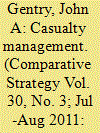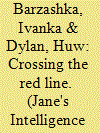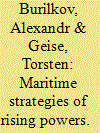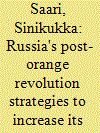| Srl | Item |
| 1 |
ID:
106265


|
|
|
|
|
| Publication |
2011.
|
| Summary/Abstract |
Since World War II, the avoidance, production, and information management of casualties independent of their effects on military forces' combat capabilities have changed political/military operational environments and become major elements of wars' strategies and tactics. Many adversaries of Western states well understand the importance of casualty management. Coherent Western policy and national debates about the strategic consequences of casualties or casualty aversion are lacking, however. This article explores some of the relationships between casualties and military tactics and strategies, domestic and international politics, and operations' outcomes, using the United States as a case study.
|
|
|
|
|
|
|
|
|
|
|
|
|
|
|
|
| 2 |
ID:
108886


|
|
|
|
|
| Publication |
2011.
|
| Summary/Abstract |
The United States and four other major Western states pursued "Contact Group" diplomacy in trying to resolve the conflict in Namibia from 1977 to 1982-1983. This analysis examines their joint mediation, paying particular attention to the efficacy and constraints of the four principal mediating strategies. First, to mediate collectively helped the Western states in terms of credibility and influence as well as burden sharing and innovation, but it posed the problems of intragroup co-ordination and division. Second, working through the United Nations made the Contact Group a legitimate and credible mediator, whilst the organisation's decolonisation agenda called the mediator's neutrality into question. Third, the Western states managed to enhance their leverage by compounding within the group or borrowing from outside although the extent of such enhancement was limited. Lastly, the Group's record on the carrot-and-stick strategy towards South Africa was also mixed, with a great impact on its performance.
|
|
|
|
|
|
|
|
|
|
|
|
|
|
|
|
| 3 |
ID:
129322


|
|
|
| 4 |
ID:
114564


|
|
|
| 5 |
ID:
123535


|
|
|
|
|
| Publication |
2013.
|
| Summary/Abstract |
This paper seeks to uncover the drivers of maritime strategy formulation in Russia and China, two active players on the international stage that have often been identified as both rising and regional powers. The paper takes as its starting point the realist theory of state power and threat perception, which provide the means and motivation for states to accumulate material capabilities in an effort to safeguard their position in the international system. Given the increasing pressures of a changing security environment, China's and Russia's maritime strategies show a trend towards greater complexity and capability. The paper also addresses the impact of the revolution in military affairs ( rma ) and its subsequent manifestation as force transformation in Western states, especially the USA. Given that this new, qualitatively focused way of war has gained supremacy, at least where high-intensity inter-state war is concerned, the question remains of whether the Chinese and Russians will choose to emulate the leading powers in the system or, instead, will forge into the unknown and formulate an entirely different and innovative maritime strategy.
|
|
|
|
|
|
|
|
|
|
|
|
|
|
|
|
| 6 |
ID:
127675


|
|
|
|
|
| Publication |
2014.
|
| Summary/Abstract |
The role of public diplomacy in Russian foreign policy has grown in recent years. There are two distinctive strands of Russian public diplomacy: one directed mainly towards Western states, and one towards the former Soviet republics. Despite the rhetoric of mutual interests and high respect for state sovereignty, the post-Soviet strand of Russian public diplomacy has more in common with the Soviet practice of 'active measures' than with the soft power of attraction commonly connected with public diplomacy. Russia's current policy runs the risk of eating away the soft power potential that Russia still enjoys in many post-Soviet states.
|
|
|
|
|
|
|
|
|
|
|
|
|
|
|
|